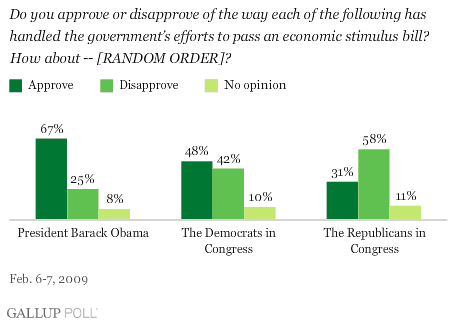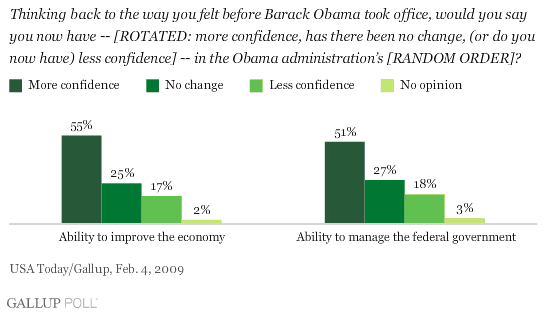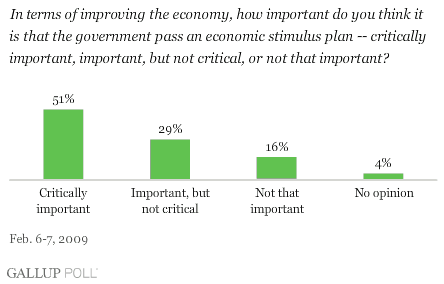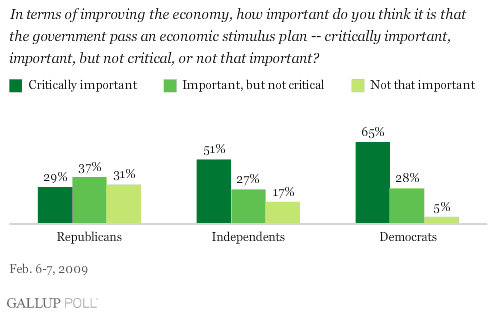PRINCETON, NJ -- The American public gives President Barack Obama a strong 67% approval rating for the way in which he is handling the government's efforts to pass an economic stimulus bill, while the Democrats and, in particular, the Republicans in Congress receive much lower approval ratings of 48% and 31%, respectively.

These findings, based on Gallup Poll interviews conducted Feb. 6-7, underscore the degree to which Obama appears to be maintaining the upper hand over his opponents from a public opinion perspective as he and congressional leaders wrangle over the precise form and substance of a new economic stimulus plan. (Recent Gallup polling also shows that a slight majority of Americans in general favor the idea of passing a stimulus plan of around $800 billion, a sentiment that has stayed constant over the last several weeks.)
Obama will address the stimulus issue before a nationwide audience on Monday night with his first prime-time news conference. He will also conduct town-hall meetings this week in Elkhart, Ind., and Fort Myers, Fla., as part of his efforts to help sell his view of the urgency of passing a stimulus package. The new Gallup data certainly suggest that these public relations efforts will find a generally receptive audience.
The data in particular show the sharp divide between the public's views of how Obama has handled efforts to pass a stimulus bill and its views of how the Republicans have handled this -- a divide that quantitatively produces a 36-point approval gap.
Some of this difference may be attributable to pre-existing views of the entities involved in the stimulus plan wrangling. President Obama's overall job approval rating (64% as of Sunday, Feb. 8) is very close to his approval rating on the stimulus, while Gallup's last measure of favorable ratings for the Republicans in Congress (in December 2008) was 25%.
These relatively positive sentiments toward Obama were reflected in recent Gallup polling that asked Americans whether their confidence in Obama's ability to improve the economy and manage the government had gotten better or had gotten worse since his inauguration. At least half of Americans said their confidence had increased, while only 17% to 18% said they had less confidence.

Critically Important?
Obama's recent efforts to create a sense of urgency that a new bill be passed would appear to resonate with at least half of the American public. The new Gallup Poll shows that a majority of Americans (51%) say passing a new economic stimulus plan is "critically important" for improving the nation's economy, while another 29% say it is important. Only 16% say it is "not that important."

Previous research has suggested that there is a sharp partisan divide concerning almost everything involved with the massive economic stimulus plan. The sense of urgency that it be passed is no exception.

Only 29% of Republicans are willing to say that passing a new stimulus bill is critically important, contrasted with the nearly two-thirds of Democrats who hold this view.
Still, a clear majority of Republicans say it's at least important to pass the bill.
Bottom Line
President Obama would appear to have the upper hand in the current focus on Congress' efforts to pass a major economic stimulus bill. Not only does Obama get much higher approval ratings for the way in which he is handling the stimulus issue than do either the Democrats or, in particular, the Republicans in Congress, but a majority of Americans agree with him that passing such a bill is critically important for improving the nation's economy.
Survey Methods
Results are based on telephone interviews with 1,018 national adults, aged 18 and older, conducted Feb. 6-7, 2009, as part of Gallup Poll Daily tracking. For results based on the total sample of national adults, one can say with 95% confidence that the maximum margin of sampling error is ±3 percentage points.
Other results are based on telephone interviews with 1,012 national adults, aged 18 and older, conducted Feb. 4, 2009. For results based on the total sample of national adults, one can say with 95% confidence that the maximum margin of sampling error is ±3 percentage points.
Interviews are conducted with respondents on land-line telephones (for respondents with a land-line telephone) and cellular phones (for respondents who are cell-phone only).
In addition to sampling error, question wording and practical difficulties in conducting surveys can introduce error or bias into the findings of public opinion polls.
Polls conducted entirely in one day, such as the one on Feb. 4, are subject to additional error or bias not found in polls conducted over several days.
